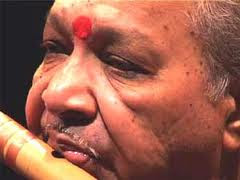Pandit Hariprasad Chaurasia in Karachi
Chaurasia Ji, himself, says he should be called a bañsuri-player and not a flute-player because the western flute is made up of a number of things that the bañsuri does not have. In fact a bañsuri, as he told the crowd in Karachi, "has no strings, no buttons, no tuning. Its just a piece of wood with a few holes and you pick it up and practice and play it!"
Pandit Pannalal Ghosh, a well-known bañsuri player, really brought this instrument into classical music … but it was Chaurasia Ji who expanded its area and is now considered to be the man who really made this reed-instrument one of the most loved and respected in India and the world of music.
Sabeen, a founder member of APMC (I was a founder member, too, when it started), was at my house and I called Ayla Raza — the 'actual' Founder of APMC, Karachi — and asked her to come to the house. I called Aneesh Pradahan and Shubha Mudgal and got Chaurasia Ji's number in Mumbai. Ayla called up the number and spoke to his daughter-in-law. She manages his bookings and we were told that he was free one night before the Indian Embassy performance in Karachi. She told us the 'rather large' sum of money he'd charge.
Hmmm: Well, it was of the kind of money that some people generally use for their daughter's wedding-day jo∂aa here — but this is only our subcontinental classical music (being performed by one its Masters) so who'd pay for this?
Ayla said she'd go and call up Arshad Mahmud (NAPA), Sharif Awan (Tehzeeb), and Hameed Haroon (Dawn). We three felt that it was important that a large venue be agreed upon and all the groups (APMC, NAPA, Tehzeeb, and Dawn) should put in the money, arrange for lots of free guests - preferably at Mohatta Palace - and let our audience hear this music. Ayla also had to get permission from ICCR in India, who had helped his coming here along with the Indian High Commission.
A whole day passed and nothing happened. Sadly, we gave it up! It was too late to invite people, or even arrange for anything at all by now. I don't know if she got to Hameed or not but was, more or less, shoo'd away by the others (or so I am told).
We arrived at 9.30 and only Abro & Attiya Dawood (and Suhaee) were there ... and, perhaps, two or three students. However, by 11 AM when the car brought Chaurasia Ji, there were (maybe!) 15-20 students and ex-students, some other guests, and the local NAPA teachers.
During Chaurasia Ji's beautiful playing, someone from PTV (I think that's who he was) managed to get two phone calls and had an assistant go out to receive them and at each time the door cranked badly while she went out and came in. Two other people took calls and spoke with friends during the performance - and one was actually told by Zia Mohyeddin Sahab that he'd be shot!
Chaurasia Ji's performance and his humor and his conversations were brilliant and a lot of fun. I hope NAPA would do this kind of thing more often … and certainly invite some of our best musicians (all of whom were missing) to these events. They should also do similar things with our own non-Karachi musicians when they come here so that students can ask them questions, talk to them, understand how each thinks and moves, and how they are so amazingly rich - despite the lack of education in many - in an area that very few people really understand.
Ayla Raza was in the evening concert but only because her husband had been invited. No one who talked to her from NAPA invited her to the morning performance, despite knowing that she was the founder of APMC. Pity!
Sheema Kermani was also at the evening concert and complained about why she had not been invited by NAPA and was told that it wasn't the job of the person she was speaking to for inviting anyone. More pity!
Pandit Hariprasad Chaurasia, born on the 1st of July, 1938, in Varanasi (Benaras), surprisingly does not come from a lineage of flautists. His mother died when he was only six and he had to learn music without his father's knowledge because his father was a wrestler who wanted his son, Hariprasad, to follow in his footsteps.
Chaurasia Ji did go to the akhaa∂a and trained with his father for a while, but he also started learning music, practising at a friend's house. He often credits his wrestling training for giving him the immense stamina and lung power. He once said ,"I was not any good at wrestling. I went there only to please my father. But maybe because of the strength and stamina I built up then, I'm able to play the bañsuri even to this day."
He was 15 when he started on the first steps to his musical career by taking classical vocal lessons with Pandit Raja Ram of Benares. A little later he heard a flute recital by Pandit Bholanath and was so impressed that he changed his vocal lessons and became a bañsuri player.
At 19, Chaurasia Ji started playing in AIR, Orissa, and when he was 24 he was transferred to the AIR headquarters in Bombay. Strange that a bañsuri player should choose a Surbahar and Sitar player as a teacher ... but music is music … and it was here that he got his brilliant training from Shrimati Annapurna Devi (then the wife of Pandit Ravi Shankar).
Annapurna Devi is the daughter of the famous Ustaad Alauddin Khan (of the Maihar Gharana). Alauddin Khan was also the father of Sarod Maestro Ustaad Ali Akbar Khan and the superb teacher of Sitar Maestro Pandit Ravi Shankar.
Ravi Shankar said in his autobiography that Ustaad Alauddin Khan told Roshan Ara Khan (Annapurna's Muslim name) when she asked him about marrying Ravi, "He is a Brahman and cannot become a Muslim, so you should convert to Hindu and marry him! ". Which is what she did.Apart from classical music, Chaurasia Ji has made a mark as a music director for Indian films along with Pt. Shivkumar Sharma, forming a group called Shiv-Hari. He told us that his first recording for a film song was with Talat Mahmood (and the now famous Sitarist Rais Khan also accompanied him).
He has also collaborated with various world musicians in experimental cross-cultural performances, including the fusion group Shakti and has played with several western musicians, for example with John McLaughlin and Jan Garbarek in Zakir Hussain's Making Music. (A brilliant CD - Get it now if you haven't heard it yet!)
Currently Chaurasia Ji is at Brindavan Gurukul in Mumbai, where he ensures that students learn the art of Indian Music as well as Fusion and Jazz. His discography can be found here.












5 Comments:
Thank you for a lovely piece full of delightful nuggets. Like so many other legendary musicians, you introduced Chaurasia Ji to me at just the right time :) I couldn't, in my wildest dreams, have imagined, that a decade and a half later, I'd be sitting in the same room as him. It was a surreal experience, bittersweet because of all the angst surrounding it, but unforgettable. Thank you for all that you do - especially for enabling access to ideas and people.
02 February, 2012 08:22
Many years ago, there was an article in India Today on Pt Chaurasia's effort to make Annapurna Devi his guru. She, true to her reclusive self, slammed the door on his face many a time until he persistently got through. Finally, she asked him why he, a bansuri player, would want to learn from a vocalist and his answer about technique and knowledge convinced her.
Incidentally, before he could become famous on his own right, he along with Shivkumar Sharma were part of R. D. Burman's orchestra. If you hear the santoor or the bansuri in a RDB composed song, it is almost certain that this duo played the instruments.
As to them charging a ton of money, they are in a bind - the subcon is notorious for bootlegging and pirating CDs/Tapes and they lose a lot of revenue that should otherwise go to them. Concerts are often the only means for them to make money.
Tangential - One of the stories that is alleged to have inspired the classic Hindi film 'Abhiman' (Jaya, Amitabh) about a male singer's clash of egos with his singer wife is the real life story of Ravi Shankar and Annapurna Devi.
04 February, 2012 22:29
Hi @Quizman: I said that the daughter in law quoted lots of money but only in jest. I countered by saying that people pay that much for a shaadi ka jo∂aa but not for the best performances of our classical musicians.
As for the Indian musicians being in a bind, ours - for whatever they are worth - are in a much greater bind, No concerts. No government support. No patrons. And, on top of all that, a crazy fundamentalist religion rising every day in the country. They call it Islam but it is not the Islam we were brought up in.
06 February, 2012 01:29
Yes, I bemoan with you the sorry state of music in your country in the grip of crazy times. Regardless, musicians in either country make a pittance most of the time, so we should vow not to begrudge them their fees, especially such stalwarts as Hari Prasad Ji who routinely give us a glimpse of the heaven.
BTW, it is "gurukul", not "gurukal". It refers to an ancient South Asian tradition of a trainee/devotee coming to live with the "guru" until he is trained in whatever art/science is the guru's forte. The trainee, thus transformed, becomes part of the guru's "kul" (literally, lineage/family).
12 February, 2012 06:50
@ajit I would never bemoan what Hari Ji or any musician makes. I said that, as I wrote back to Quizman, 'only in jest'. I think they deserve all that they ask.
I am not sure if the shaadi jo∂aas are as expensive in India (but they must be!) and that spending is what I really bemoan!
(Have corrected the Gurukul — it was my mistake. I go to that site often and 'typed' it wrongly. Thanks.)
12 February, 2012 13:19
Post a Comment
<< Home